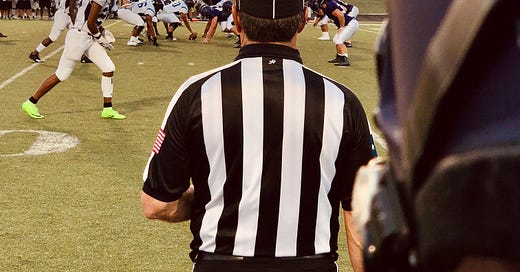(The following is a true story. Feel free to laugh at all characters involved.)
It was a hot Texas August Thursday afternoon at Timber Creek High School football stadium in Keller around 5 p.m. The steam was rising from the turf. I was as engaged as an NFL coach stalking the sidelines during a Super Bowl, ready to motivate the Freshman “B” team in any way possible.
After playing college football, I knew the team needed to play with grit, resolve, focus, and unrelenting effort to charge their way to victory. I was all hype. X’s and O’s were secondary. Let’s do this, boys!
Little did I realize that I was coaching freshmen boys. They are the gift that keeps on giving. They are the embodiment of bliss that ignorance affords. Some players didn’t even know the difference between their knee and shoulder pads or have the slightest sense of realizing their jersey feels so uncomfortable because it’s on backward.
Nevertheless, I was resolved to make these boys into men, and there was no better medium to start this process than through football. I was serving them with my witty quotes, high 23-year-old energy, and ideological spirit. I soon learned how much they would do for me, with their uncanny and unassuming unfamiliarity with—almost everything pertaining to life.
We were in the second quarter. The sun was beating down. The offense had the ball, and it was 2nd down and about 7 yards to go for another first down in the opponent’s territory. The team was marching down the field, looking as if they might score the game’s first touchdown.
The coaches sent in a pass play we’d practiced the last two weeks. All the quarterback had to do was take a 3-step drop and complete a 5-yard pass to the outside wide receiver. This play would at least give us a chance on 3rd down to convert.
The quarterback (let’s call him Nick) got under center, placing his hands just beneath the crotch of the center. “Red 18! Red 18,” he barked as he started his cadence. “Set! Hike!” The center snapped the ball between his legs, and the play began to unfold. As the freshman wide receivers coach, I saw my wide receiver do precisely as I taught him. He sprinted five hard steps, stopped, turned, and looked for the pass from the quarterback, Nick.
My receiver was open. “The play’s going to work,” I thought to myself. Except it didn’t. Nick, the quarterback, took a 3-step drop and threw the ball as far out of bounds as he could.
I scrunched my face and looked at the other coaches, who shared the same look of confusion. Assuming Nick misheard the play, we sent in the same play with another wide receiver and reiterated the play call.
Next play. Now 3rd down—same setup. Under center. Cadence. Ball snaps. Same result, with the ball landing even farther out of bounds than last time, with the receiver somehow even more open than the previous play.
Last chance. 4th down. We tried it one more time, convinced our quarterback was just confused. So we called him over and told him the play exactly so it wouldn’t get lost in translation from a teammate. He received the play, nodded his head, ran back to the huddle, called the play, and approached the line of scrimmage.
“Okay,” we coaches said to each other. “Here we go.” Same setup. Same cadence—same result! Turnover on downs. No points for the home team.
When the offense came off the field, I pulled Nick, the quarterback, to the side and, with all the bravado I could muster, asked him, “Nick, what’s wrong with you son? Are you scared!” In the football school of hard knocks I came from, if a man asks you such a question, you unflinchingly answer “no,” even if you are on the verge of peeing your pants because you’re so scared.
So I figured asking Nick if he was scared would make him sober up, get his head in the game, and execute the play the next time the offense had the ball.
“What’s wrong with you Nick? Are you scared?!” He looked at me dead in my eyes, his eyes as big as two fishbowls, and answered: “Yessir.”
Confused at his answer—because football players weren’t supposed to answer yes to that question—I asked again, assuming he misheard me. “No, Nick, I said are you scared?!” His eyes were still as big as possible, and he unwaveringly answered again, “Yessir. I’m a little bit scared.”
As I stared into the dark abyss of Nick’s scared little eyes, I drowned in his honesty. I needed a lifeboat. I had no answer for him or myself. What do you say to a kid whose job it is to literally touch the football every single play on offense and distribute it to the rest of the team, but he’s too scared to do that? At the time, I hadn’t a clue.
“Well,” I said to Nick, “go have a seat on the bench for a while, I guess.” “Yessir,” Nick unashamedly replied, taking off his helmet—relieved not to be going back in the game. And that’s when I realized I knew nothing about coaching football yet.
Over time I learned to assume nothing about freshman boys except that they knew nothing. And in that way, I was just like them—I knew nothing.
There’s a subtle comfort in ignorance that disrupted me and Nick’s life that day. Before that first high school football game, Nick was happy to play quarterback, unaware of everything it required of him. I was glad to coach freshman football, oblivious to everything it required of me. Once we both knew what our roles required, comfort evaporated, and the actual work associated with understanding had to commence.
So here’s to not knowing everything today. Knowledge will come and demand your time, energy, and work to do something constructive with it.





